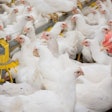
Very seldom does a day go by where I don’t listen to at least some Christian radio.
My Christian station of choice is our area Bott Radio Network affiliate. It plays a lot of sermons from some of my favorite non-local pastors. I’ve got a lot of good out of listening to guys like the Revs. Greg Laurie, Chip Ingram and Tony Evans, as well as other ministers who preach on the network.
On Saturday, when I was driving to a neighboring town to run errands, I flipped the radio to said station. Maybe I could find a little inspiration. Instead, the station was playing one of those programs to which the network likes to refer as Christian news and information. I looked at the clock in my truck and saw that it was only about nine minutes until the next program came on, so I thought I’d wait it out and kept the dial where it was.
I’m glad I did. Because in that final nine minutes, they talked about meat alternatives, which of course is a topic of interest to our readers.
Oh, yeah. This is totally bloggable, I told myself while listening to it. But obviously since I was driving, I didn’t take notes. Luckily, that program was archived on the Bott website so I listened to it again.
The program was called Understanding the Times, hosted by Jan Markell, founder and director of Olive Tree Ministries. Her guest was the Rev. Brandon Holthaus of Rockharbor Church in Bakersfield, California, who elaborated on his views of meat alternatives when Markell brought up the topic of the food supply.
Why radio show participants oppose alternative proteins
Obviously, as a farm boy and proponent of the animal agriculture industry, I’m not a huge fan of the alternative protein movement. I’d rather eat and see other people eating farm-raised meat than plant-based protein, cultured meat and insects.
Markell and Holthaus clearly shared my opinion, but for different reasons.
The main reason they spoke against it was they feel these alternatives are being pushed by people they call globalists. And maybe they’re not wrong about that.
Holthaus did bring up some points that seem valid, and if true, they are things the cultured meat and insect protein companies must address.
He mentioned a study that showed that lab-grown meats have cancer cells in them. He asked, “Why would they want to feed synthetic meat that could cause cancer?”
He also spoke out against insect proteins, saying that 80% of the crickets raised for human consumption have parasites on them.
He also noted that artificial meats aren’t accessible to consumers in third-world countries.
But here is where Holthaus’ comments really got me. He said: “There’s a strategy by the globalists to get us off of protein. What we know is that (if) you restrict protein, especially in third world countries, many people will die, and they don’t have a problem with that. They want to reduce the population by 70%. So they’re going to force global starvation and limit the protein. … I don’t think it’s an accident because again, the whole global movement wants to do a major depopulation to get it down to about 1 billion people on the planet. That’s a lot of death, and they say they want it in a civilized way. The civilized way looks like it’s going to be starvation.”
Markell did not question any of his claims, either.
Did guest take things too far?
Those are bold comments, and risky ones too. It would appear Holthaus put himself in a position to have maybe violated the ninth commandment, which forbids bearing false witness against your neighbor. I said “maybe,” because I don’t want to put myself at risk of violating the commandment myself.
While I honestly believe I would have received just as much spiritual uplifting by listening to a hair metal music station as I did listening to Markell and Holthaus, I don’t regret listening to the show.
However, there are plenty of other arguments to why consumers should stick with eating traditional meat and poultry, and I am confident that people in the animal agriculture industry will not ever have to resort to Holthaus’ reasonings and instead make the point that chicken, turkey, beef and pork are flavorful, affordable, nutritious and sustainable.


















